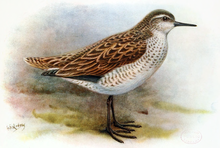Christmas sandpiper
| Christmas sandpiper | |
|---|---|

| |
| 1907 illustration by George Edward Lodge | |
| Scientific classification | |
| Domain: | Eukaryota |
| Kingdom: | Animalia |
| Phylum: | Chordata |
| Class: | Aves |
| Order: | Charadriiformes |
| Family: | Scolopacidae |
| Genus: | Prosobonia |
| Species: | †P. cancellata
|
| Binomial name | |
| †Prosobonia cancellata (JF Gmelin, 1789)
| |
| Synonyms | |
|
Tringa cancellata Gmelin, 1789 | |
The Christmas sandpiper or Kiritimati sandpiper (Prosobonia cancellata) was a small shorebird. It became extinct some time in the first half of the 19th century. It was endemic to Christmas Island (now called Kiritimati), since 1919 a part of Kiribati. It is known solely from a single contemporaneous illustration (by William Wade Ellis), and a description by William Anderson, both made during the third circumnavigation voyage commanded by Captain James Cook, which visited the atoll of Christmas Island between 24 December 1777 and 2 January 1778.[2]
Taxonomy
[edit]The Christmas sandpiper was formally described in 1789 by the German naturalist Johann Friedrich Gmelin in his revised and expanded edition of Carl Linnaeus's Systema Naturae. He placed it with the sandpipers in the genus Tringa and coined the binomial name Tringa cancellata.[3] Gmelin based his description on the "Barred phalarope" from Christmas Island that had been described in 1785 by the English ornithologist John Latham in his A General Synopsis of Birds . Latham's specimen had been supplied by the naturalist Joseph Banks.[4] Banks had accompanied James Cook on his first voyage to the south Pacific but had also received specimens from Cook's subsequent voyages.[5] The Christmas sandpiper is now placed in the genus Prosobonia that was introduced by Charles Lucien Bonaparte in 1850.[6] The specific epithet cancellata is from Latin canellatus meaning "trellis-like" or "lattice-like".[7]
-
William Ellis' image
References
[edit]- ^ BirdLife International (2017). "Prosobonia cancellata". IUCN Red List of Threatened Species. 2017: e.T62289108A119208101. doi:10.2305/IUCN.UK.2017-3.RLTS.T62289108A119208101.en. Retrieved 12 November 2021.
- ^ Jansen, Justin J.F.J.; Cibois, Alice (22 June 2020). "Clarifying the morphology of the enigmatic Kiritimati Sandpiper Prosobonia cancellata (J. F. Gmelin, 1785), based on a review of the contemporary data". Bulletin of the British Ornithologists' Club. 140 (1): 142–146. doi:10.25226/bboc.v140i2.2020.a4.
- ^ Gmelin, Johann Friedrich (1789). Systema naturae per regna tria naturae : secundum classes, ordines, genera, species, cum characteribus, differentiis, synonymis, locis (in Latin). Vol. 1, Part 2 (13th ed.). Lipsiae [Leipzig]: Georg. Emanuel. Beer.
- ^ Latham, John (1785). A General Synopsis of Birds. Vol. 3, Part 1. London: Printed for Leigh and Sotheby. p. 274, No. 5.
- ^ Medway, D.G. (2009). "The fate of the bird specimens from Cook's voyages possessed by Sir Joseph Banks". Archives of Natural History. 36 (2): 231–243. doi:10.3366/E0260954109000965. PMID 20014506.
- ^ Gill, Frank; Donsker, David; Rasmussen, Pamela, eds. (August 2022). "Sandpipers, snipes, coursers". IOC World Bird List Version 12.2. International Ornithologists' Union. Retrieved 3 November 2022.
- ^ Jobling, James A. (2010). The Helm Dictionary of Scientific Bird Names. London: Christopher Helm. p. 88. ISBN 978-1-4081-2501-4.


